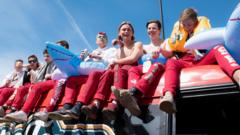Norwegian school-leavers in vibrant red overalls celebrating their graduation is a familiar sight, particularly around the country's national day on May 17. However, the tradition known as "russ" is being scrutinized as parties begin weeks before students complete their exams, raising concerns among parents and educators.
Among the participants are Selma Jenvin-Steinsvag and her classmate Aksel, both 18, as they hurry to catch the Oslo metro. "After that all our written exams will be done," Selma remarked, marking the beginning of their celebrations. These festivities have increasingly spiraled out of control, with the russebuss becoming a focal point of the concerns.
Edvard Aanestad, 19, describes his experiences with the russebuss: "It's a party bus! We go out every night for a month, we get drunk, we're partying with our friends and it's just fun!" Yet, this excitement is mirrored by worries over negative implications for students' health and academic performance due to the excessive partying and peer pressure to partake.
The financial burden of renting and outfitting these buses often leads students into debt, with buses driving all night and playing loud music. Critics of the tradition have noted a rise in heavy drinking, drug use, and sleep deprivation during this period, which conflicts with the peak of the exam season.
Prime Minister Jonas Gahr Støre has acknowledged the party bus culture's descent into excess, highlighting the potential harm it poses to youths. This sentiment echoes in the comments of parents like Solveig Haukenes Aase, who expresses concern not just for her graduating child, but also for her younger children who are yet to experience high school. “In recent years, it has also started to have an impact on middle school kids,” Aase said, emphasizing a shift in attitudes towards the celebration.
Norway's Minister of Education, Kari Nessa Nordtun, agrees that the intertwining of parties and examinations presents an alarming scenario. Statistics indicate declining performance among students due to distractions from partying. Additionally, she noted the commercialization of celebrations has exacerbated issues of social exclusion among students.
To address these concerns, a proposal has been made to reschedule the celebrations for after exams, aiming for an inclusive graduation event that does not place financial strain on students. "We want to put an end to social exclusion, peer pressure, and high costs for many young people," she stated.
Laments regarding the traditional party bus, which dates back to the early 1980s in Oslo, suggest that its essence has shifted from a collective school event to a more exclusive gathering. Author Ivar Brandvol points to an alarming commercialization trend where some bus groups may set budgets as high as 3 million kroner (£220,000), ultimately leading students to fundraise aggressively or rely on their savings.
The Norwegian government is moving to ensure a safer environment for celebrating teens, with Minister of Transport Jon-Ivar Nygard advocating for a ban on buses designed with sideways seating and standing room. However, students like Edvard fear that restrictions will only exacerbate issues of exclusivity, stating, "If anything, it's the opposite, so it's the wrong way to go."
The debate continues as both students and policymakers seek a balance between tradition and safety, with the future of Norway's russebuss culture hanging in the balance.



















